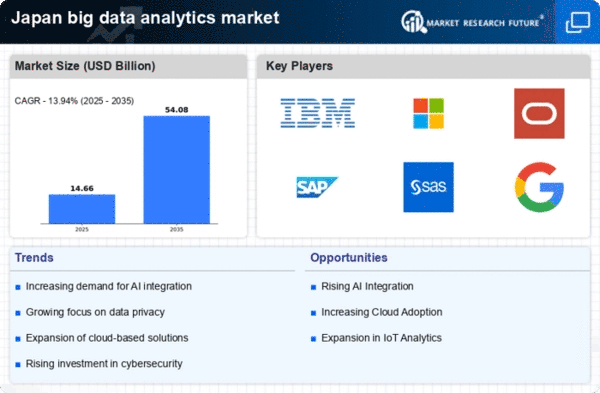Expansion of IoT Devices
The proliferation of Internet of Things (IoT) devices in Japan is a critical driver for the big data-analytics market. With millions of connected devices generating vast amounts of data, organizations are compelled to harness this information for actionable insights. The Japanese government has been actively promoting IoT initiatives, which has led to an increase in data generation across various sectors, including manufacturing and healthcare. It is estimated that by 2025, the number of IoT devices in Japan could exceed 1 billion, creating a substantial demand for analytics solutions capable of processing and analyzing this data. Consequently, businesses are investing in big data-analytics tools to manage and interpret the influx of information, thereby enhancing operational efficiency and innovation.
Government Initiatives and Support
Government initiatives in Japan play a pivotal role in shaping the big data-analytics market. The Japanese government has launched various programs aimed at fostering innovation and encouraging the adoption of data-driven technologies. For instance, the 'Society 5.0' initiative emphasizes the integration of advanced technologies, including big data analytics, into everyday life. This strategic focus is expected to drive investments in analytics solutions, as public and private sectors collaborate to leverage data for societal benefits. Furthermore, funding and support for research and development in data analytics are likely to increase, potentially leading to a more robust ecosystem for the big data-analytics market. As a result, businesses may find themselves better equipped to utilize data for strategic decision-making.
Rising Demand for Real-Time Analytics
The big data-analytics market in Japan experiences a notable surge in demand for real-time analytics solutions. Organizations are increasingly recognizing the value of immediate insights derived from data, which can enhance decision-making processes. This trend is particularly evident in sectors such as finance and retail, where timely data can lead to competitive advantages. According to recent estimates, the market for real-time analytics in Japan is projected to grow at a CAGR of approximately 25% over the next five years. This growth is driven by the need for businesses to respond swiftly to market changes and consumer behaviors, thereby solidifying the importance of real-time analytics within the big data analytics market. As companies invest in advanced technologies, the landscape of data processing and analysis is likely to evolve significantly.
Emergence of Advanced Analytical Tools
The emergence of advanced analytical tools is transforming the big data-analytics market in Japan. As technology evolves, businesses are increasingly adopting sophisticated analytics platforms that incorporate machine learning and artificial intelligence capabilities. These tools enable organizations to analyze complex datasets more effectively, uncovering patterns and trends that were previously difficult to identify. The market for advanced analytics tools in Japan is projected to grow significantly, with estimates suggesting a CAGR of around 20% over the next few years. This growth is driven by the need for organizations to gain deeper insights from their data, ultimately leading to improved operational efficiency and enhanced customer experiences. As such, the adoption of these advanced tools is likely to shape the future of the big data-analytics market.
Growing Focus on Data-Driven Decision Making
In Japan, there is a marked shift towards data-driven decision-making across various industries, significantly impacting the big data-analytics market. Organizations are increasingly recognizing that data can provide valuable insights that inform strategic choices. This trend is particularly pronounced in sectors such as retail, where companies utilize analytics to understand consumer preferences and optimize inventory management. According to industry reports, approximately 70% of Japanese companies are expected to adopt data-driven strategies by 2026. This growing emphasis on analytics is likely to drive demand for sophisticated tools and platforms that can process large datasets efficiently, thereby enhancing the overall landscape of the big data-analytics market.
















